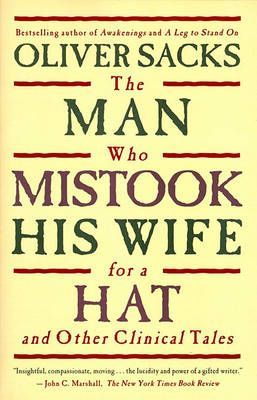One of the great clinical writers of the twentieth century (The New York Times) shares individual case histories of his patients with neurological disorders, from a talented music professor who lost the ability to recognize familiar people and common objects (who literally mistook his wife for hat), to a middle-aged gentleman who lost all memories beyond the age of twenty, to people whose limbs no longer feel like their own.
Dr. Sacks has an incredible sense of presenting a patient situation in such a way that astonishes the healthy human mind. Some of the stories are so alien that they are utterly fascinating. Since The Man Who Mistook His Wife for a Hat was written over 30 years ago, I find myself wanting modern tests run on all these subjects. From a scientific standpoint, these patients seem like missed opportunities.
But just when you decide someone needs to track down the patients who are still alive for further study, Dr. Sacks proves his status a true healer of humanity. Instead of treating his patient as subjects, he reminds the reader they are also people. These patients are men and women struggling against their biology, attempting to find purpose and live their lives. And although many have IQs of 60 or are deficient in some areas, many are extremely talented in art or mathematics.
These tales are easily accessible and quite captivating. However, you will not find discussions of what’s occurring in the brain or any neurological details. Rather, each chapter focuses on a single individual’s story, which feels more like a collection of character studies than a modern detached collection of clinical trials. With the increase in psychology as popular science over the last several years, many of the stories and terminology feel outdated but are nonetheless compelling.
Recommended as an introduction to neurology and a humbling meditation on what it means to be human!
“But who was more tragic, or who was more damned—the man who knew it, or the man who did not?”
